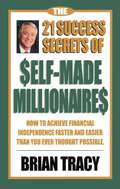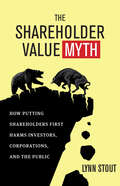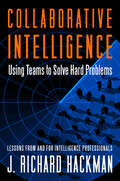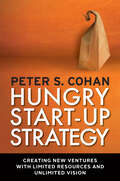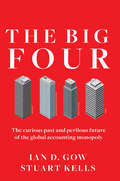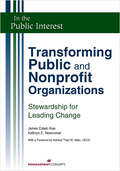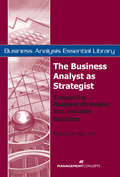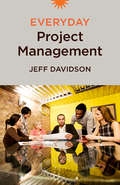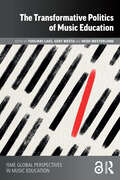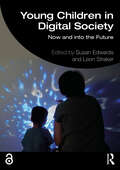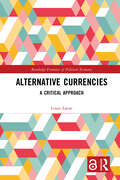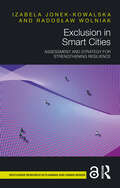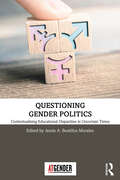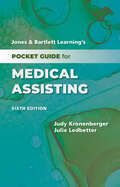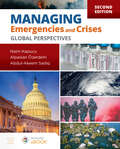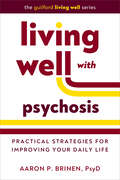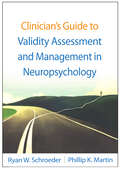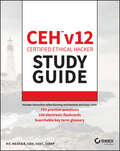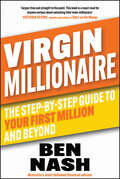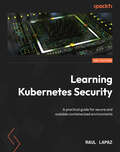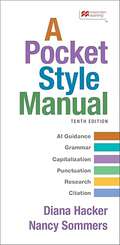- Table View
- List View
Shifting Sands: A Guidebook for Crossing the Deserts of Change
by Steve Donahue"We had no vehicle. We didn't know how or if we could continue heading south. I was in a vast, seemingly endless desert. I didn't know when or if we'd make it to the other side. I didn't even know where the other side was. It wasn't in Algeria. I knew that much. Was it in Niger? Where does the Sahara actually end?" We live in a culture, Donahue writes, which loves "climbing mountains." We want to see the peak, map out a route, and follow it to the top. Sometimes this approach works, but not always, particularly when we are enduring a personal crisis-divorce, job loss, addiction, illness, or death. We may not know exactly where we are going, how to get there, or even how we'll know we've arrived. And it's not just in times of crisis. There are many deserts in our lives, situations with no clear paths or boundaries. Finding a job is usually a mountain, but changing careers can be a desert. Having a baby is a mountain, especially for the mom. But raising a child is a desert. Battling cancer is a mountain. Living with a chronic illness is a desert. In the desert, we need to follow different rules than we follow when conquering a mountain. We need to be more intuitive, more patient, more spontaneous. Donahue outlines six "rules of desert travel" that will help us discover our direction by wandering, find our own personal oases, and cross our self-imposed borders. "The sun appears like a silent explosion, a slow motion fireworks display dazzling the volcanic crags of the Hoggar. I stand up and walk to the path and begin descending to Klaus' car. I've made my decision. Tallis and I will travel, somehow, to Agadez. I don't have a logical explanation for my decision or a plan to get to the last oasis. I know I am on the right journey-I am following my compass." Shifting Sands shows us how to slow down, reflect, and embrace the changes of life graciously, naturally, and courageously.
The 21 Success Secrets of Self-Made Millionaires: How to Achieve Financial Independence Faster and Easier Than You Ever Thought Possible (The Laws of Success Series)
by Brian TracyDo you ever hear about a self-made millionaire in the news and wonder: how did they achieve it? In this book, Brian Tracy walks you through the hidden secrets of what makes self-made millionaires, and shows how anyone, no matter where they are in life at this moment, can become a millionaire. The advice in this book is based on Brian Tracy's twenty-five years of research, teaching, and personal experience on the subject of self-made millionaires. Tracy himself used these ideas to rise from humble beginnings to become a millionaire. And Tracy has discovered that all successful people practice these 21 success secrets, whether they're consciously aware of it or not. In The 21 Success Secrets of Self-Made Millionaires Tracy not only identifies and defines each success secret, but also reveals its source and foundation, illustrates how it functions in the world, and shows how to apply it in life and work through specific steps and practical exercises that everyone can use. Easy to read, easy to understand, and easy to apply, this book shows how anyone can cultivate the habits and behaviors that will enable them to achieve not just financial independence, but success in any area of life. Because, as Tracy writes, "The most important part of achieving great success is not the money. It is the kind of person you have to become to earn that money and hold onto it."
The Shareholder Value Myth: How Putting Shareholders First Harms Investors, Corporations, and the Public
by Lynn A. StoutExecutives, investors, and the business press routinely chant the mantra that corporations are required to “maximize shareholder value.” In this pathbreaking book, renowned corporate expert Lynn Stout debunks the myth that corporate law mandates shareholder primacy. Stout shows how shareholder value thinking endangers not only investors but the rest of us as well, leading managers to focus myopically on short-term earnings; discouraging investment and innovation; harming employees, customers, and communities; and causing companies to indulge in reckless, sociopathic, and irresponsible behaviors. And she looks at new models of corporate purpose that better serve the needs of investors, corporations, and society.
Collaborative Intelligence: Using Teams to Solve Hard Problems (Bk Business Ser.)
by J. Richard HackmanIntelligence professionals are commonly viewed as solo operators. But these days intelligence work is mostly about collaboration. Interdisciplinary and even inter-organizational teams are necessary to solve the really hard problems intelligence professionals face. Tragically, these teams often devolve into wheel-spinning, contentious assemblies that get nothing done. Or members may disengage from a team if they find its work frustrating, trivial, or a waste of their time. Even teams with a spirit of camaraderie may take actions that are flat-out wrong. But there is also good news. This book draws on recent research findings as well as Harvard Professor Richard Hackman’s own experience as an intelligence community researcher and advisor to show how leaders can create an environment where teamwork flourishes. Hackman identifies six enabling conditions – such as establishing clear norms of conduct and providing well-timed team coaching – that increase the likelihood that teams will be effective in any setting or type of organization.. Although written explicitly for intelligence, defense, crisis management, and law enforcement professionals it will also be valuable for improving team success in all kinds of leadership, management, service, and production teams in business, government, and nonprofit enterprises.
Hungry Start-up Strategy: Creating New Ventures with Limited Resources and Unlimited Vision
by Peter S. CohanEntrepreneurs are hungry. But it’s not just because they’re living on ramen and adrenaline while they pour their all into their business. Peter Cohan has found it’s something deeper: a hunger to create the kind of world they want to work in. To leave a legacy, they build carefully with limited resources and maintain control of the venture’s direction. For years, students have told Cohan that the seminal business strategy guide, Michael Porter’s Competitive Strategy, was too big-company focused. So Cohan—who once worked with Porter—has written the first business strategy book to address start-ups’ very different challenges. Cohan focuses on six key start-up choices—setting goals, picking markets, raising capital, building teams, gaining market share, and adapting to change—explaining the unique rules start-ups must follow. For example, when setting goals, large corporations try to maximize their long-term return on equity, but resource-poor start-ups have to plan by setting a series of short-term goals—and how they do this will mean the difference between blazing a trail or flaming out. When entering a new market, well-fed companies can invest substantial time and capital before ever launching a product, but hungry start-ups must get an adequate prototype in front of customers fast, get feedback, and quickly develop a viable business model or they’ll starve to death. For each of these six areas, Cohan provides a decision-making approach and lively case studies of what actual entrepreneurs have done. He extracts hard-hitting lessons not only for start-ups but also for investors and even established companies. Hungry Start-up Strategy offers a full menu of vital information for anyone seeking to cook up a thriving business from scratch.
The Big Four: The Curious Past and Perilous Future of the Global Accounting Monopoly
by Ian D. Gow Stuart Kells"Messrs. Gow and Kells have made an invaluable contribution, writing in an amused tone that nevertheless acknowledges the firms' immense power and the seriousness of their neglect of traditional responsibilities. 'The Big Four' will appeal to all those interested in the future of the profession--and of capitalism itself." —Jane Gleeson-White, Wall Street JournalWith staffs that are collectively larger than the Russian army and combined revenues of over $130 billion a year, the Big Four accounting firms—Deloitte, PricewaterhouseCoopers, Ernst & Young, and KPMG—are a keystone of global commerce. But leading scholar Ian Gow and award-winning author Stuart Kells warn that a house of cards may be about to fall.Stretching back to the Medicis in Renaissance Florence, this book is a fascinating story of wealth, power, and luck. The founders of the Big Four lived surprisingly colorful lives. Samuel Price, for example, married his own niece. Between the world wars, Nicholas Waterhouse collected postage stamps while also hosting decadent parties in his fashionable London home. All four firms have endured major calamities in recent decades. There have been hundreds of court cases and legal prosecutions for failed audits, tax scandals, and breaches of independence. The firms have come so close to "extinction level events" that regulators have required them to prepare "living wills." And today, the Big Four face an uncertain future—thanks to their push into China, their vulnerability to digital disruption and competition, and the hazards of providing traditional services in a new era of transparency. This account of the past, present, and likely future of the Big Four is essential reading for anyone perplexed or fascinated by professional services, working or considering working in the industry, or simply curious about the fate of the global economy.
Transforming Public and Nonprofit Organizations: Stewardship for Leading Change
by James E. Kee JD, MPA Kathryn E. Newcomer PhDIn the public and nonprofit arenas, leaders face the unique challenge of protecting the public interest while implementing organizational change initiatives. To succeed, these leaders must build organizations that are "change-centric," carefully weigh and prepare for the risks of change, and develop a change-oriented leadership style that authors Kee and Newcomer call transformational stewardship.A comprehensive approach to leading change, Transforming Public and Nonprofit Organizations: Stewardship for Leading Change provides public and nonprofit leaders and students of leadership, management, and organizational change with theoretical knowledge and practical tools for accomplishing change goals while protecting the broader public interest. This insightful and useful guide offers:An introduction to the change-oriented leadership concept, transformational stewardshipAn easy-to-follow model for initiating change in the public interestCase studies, practical tips, and resources for additional learningAn organizational assessment instrument to gauge readiness for major changeA 360-degree assessment instrument to identify individual leadership strengths and areas for improvement
Leadership and the Art of Struggle: How Great Leaders Grow Through Challenge and Adversity
by Steven SnyderAll Leaders Face Adversity. Exceptional Leaders Thrive in It. Leadership is often a struggle, and yet strong taboos keep us from talking openly and honestly about our difficulties for fear of looking weak and seeming to lack confidence. But Steven Snyder shows that this discussion is vital—adversity is precisely what unlocks our greatest potential. Using real-life stories drawn from his extensive research studying 151 diverse episodes of leadership struggle—as well as from his experiences working with Bill Gates in the early years of Microsoft and as a CEO and executive coach—Snyder shows how to navigate intense challenges to achieve personal growth and organizational success. He details strategies for embracing struggle and offers a host of unique tools and hands-on practices to help you implement them. By mastering the art of struggle, you’ll be better equipped to meet life’s challenges and focus on what matters most. “Leadership and the Art of Struggle provides you with the opportunity to learn from Snyder’s remarkable wisdom. It is a living guide that you can return to time and time again as new situations arise.” —From the foreword by Bill George, former CEO, Medtronic; Professor of Management Practice, Harvard Business School; and author of the bestselling True North “The leadership book of the year…one of the most intelligent, revealing, and practical books on the subject I have ever read. It confronts a vital truth: that challenge is the crucible for greatness and that these adversities introduce us to ourselves.” —Jim Kouzes, coauthor of the bestselling The Leadership Challenge “Steven Snyder covers all the bases from channeling your energy to managing conflict, including a great segment about overcoming your leadership blind spots...This encouraging book is a must-read!” —Ken Blanchard, coauthor of The One Minute Manager and Great Leaders Grow “Leadership and the Art of the Struggle gives you clear and compelling advice on transforming pitfalls into possibilities.” —Jodee Kozlak, Executive Vice President, Human Resources, Target
The Business Analyst as Strategist: Translating Business Strategies into Valuable Solutions
by Kathleen B. Hass PMPAn organization's ability to achieve strategic goals through programs and supporting projects depends on its ability to establish a future vision, set strategic goals, select the most valuable projects, and then execute flawlessly. Organizational strategic alignmentis achieved by converting strategic plans and goals into a valuable portfolio of programs and supporting projects. Strategic project leaders and project teams execute the project plans to meet objectives and deliver project outcomes, adding value to the organization. As the role of the business analyst evolves and matures, senior business analysts will emerge as the key individuals in the organization who have the depth of businessacumen and technological proficiency to serve as both business and technology experts. In this capacity, business analysts will become involved in an array of activities designed to devise a strategy to reach the organization's future business vision by achieving strategic goals. As the business analyst elevates into a leadership role as the business and technology strategist, he or she serves the executive team by facilitating, informing, and enabling the most favorable business decisions during the strategic planning and enterprise analysis phases of the business solution life cycle (BSLC). This book examines the emerging critical role of the business analyst during these first two phases of the BSLC.
Everyday Project Management
by Jeff Davidson"Everyday Project Management is a practical guide for anyone new or needing to learn more about project management. Unlike many other books, it does not rely on arcane concepts and terms, and simply tells it like it is."—Todd C. Williams, President of eCameron, Inc., and author of Filling Execution Gaps and Rescue the Problem ProjectEveryday Project Management provides the direction you need to apply project management's time-tested tools for keeping things on time and under budget. It introduces the wide variety of tasks you will have to tackle, including assembling a team, mapping out a plan, monitoring progress, keeping your team motivated, and using appropriate planning tools, such as project management software or wall charts. In addition, you'll gain a clearer picture of the project manager's role in the conception, planning, execution, control, and completion of a project.Each chapter offers essential bite-sized nuggets of wisdom that will help you succeed, outlining the kinds of challenges you'll encounter, the interpersonal issues that will arise, and ways to stay on time and on budget in pursuit of the desired quality outcome. You'll learn how Gantt charts can keep your project on schedule, how the critical path method can be used to conserve resources, and how to juggle multiple projects, bosses, and reporting structures. Whether you are managing one project or many, this quick and easy guide to the tasks, tools, and skills of project management will carry you from project launch to project completion. Most importantly, you will learn why having a work-life balance is vital to project managers who seek long and prosperous careers.
The Transformative Politics of Music Education (ISME Series in Music Education)
by Gert Biesta Heidi Westerlund Tuulikki LaesThis book introduces a unique approach to the interconnections between music education and politics. By taking a broader, more diverse, and explicitly ethico-political philosophical and theoretical stance, the book challenges institutional and structural conditions that may be resistant to change and expands the understanding of the professional responsibility of music educators in the 21st century to meet a variety of societal and ecological challenges.Emerging from a collaboration between international music education scholars and prominent contemporary educational theorist Gert Biesta, this book connects contemporary educational theories with music education to unlock its transformational capacity. In eight chapters, the contributors show how music education can move towards ways of being and doing that are attuned to social justice and to the broader social and ecological responsibility of music professionals. Strengthening the interdisciplinary connections between music education and education, philosophy, sociology, policy, systems thinking, and more, the volume offers a renewed vision of the scope and boundaries of both music teacher education and professional work in music more widely.Connecting the decades-long work of internationally established music educator scholars and ideas from large-scale research projects with a shared interest in transformative theorisation, this book fills a knowledge gap and reframes the philosophy of music education as a vibrantly multidisciplinary, theory-generating field. Relevant to researchers and students across music teacher education and performance studies, this book speaks to both conservatoires and university contexts across Europe and North America, helping us unlock the transformative capacity of music education.
Young Children in Digital Society: Now and into the Future
by Susan Edwards Leon StrakerMoving the conversation about young children and digital technologies away beyond “good” or “bad”, Susan Edwards and Leon Straker present an innovative perspective to educators, researchers, and communities on how to support young children to learn and thrive safely in a digital society.This book marks a turning point in research concerning young children and technologies. Instead of focussing on the impacts of technology on children in ways that generate conflicting information, advice, and opinions, this book centres on understanding how children live, learn, and play in digital society, and how the adults in their lives can actively create opportunities that support them to participate safely so that they can thrive. Based on a groundbreaking research project in partnership with industry, this text showcases the development of well-designed end-user content and materials, such as videos, infographics, and books, that best support young children and their adults living, learning, and playing in digital society. It includes practical examples for early childhood educators and broader communities, such as ways to promote physical activity with digital technologies, support children with online safety, facilitate peer relationships using technologies, and engage in digital play for learning. For a closer look into the additional resources and support available, visit https://youngchildrendigitalsociety.com.au/. A refreshing perspective on young children and digital technology, this book is set to become a foundational text for early childhood educators, policy makers, and communities.
Alternative Currencies: A Critical Approach (Routledge Frontiers of Political Economy)
by Louis LarueA wide variety of new forms of money have been developed in recent decades as a challenge or complement to the official, dominant currencies. LETS, local currencies, carbon currencies, and Bitcoins are all examples of this new trend. These currencies are at the heart of a larger movement that questions the present state of money and argues that new currencies might help to build resilient economies and “warmer” social relations.This book focuses on radical alternative proposals as well as on small-scale experiments, and makes use of the analytical tools of philosophy and of economics, with one main question in mind: can alternative currencies constitute desirable alternatives to the present monetary system? Overall, the book will raise serious doubts regarding the capacity of such currencies to deliver on their promises. In part, it will show that several arguments in favour of alternative currencies are lacking in consistency and clarity, and are thus in need of thorough revision. More fundamentally, it will argue that these currencies rarely succeed in fulfilling their objectives and that their fulfilment would entail significant conflicts with justice and economic efficiency.This book is addressed to researchers in economics, politics, and philosophy of money, especially those working on alternative monetary systems.
Elevating Humanity via Africana Womanism (Routledge Focus on Literature)
by Clenora Hudson (Weems)Elevating Humanity via Africana Womanism is a short, but powerful book, advocating synergy via unity/collectivity as a panacea for all societal ills. It discusses the Africana Womanism theory - an authentic family centered concept for all women of African descent - as a grid upon which to erect the private and public personae of all positive Africana people. Within the context of our cultural and historical matrix, it opens with defining the paradigm, while promoting the importance of prioritizing race, class and gender, the triple plight of Black women. A workable strategy for ensuring equality for all, it closes on a note of love and spirituality, while embracing the special connection between Africana men and women, the 2-sided human coin.This introduction logically and convincingly speaks truth to power about who we, Black women are, beginning, in Part One, with naming and defining ourselves, with the foreknowledge of the seminal role of our male counterparts. It identifies the 18 descriptors of the true Africana woman and her male counterpart. Part Two offers fruitful commentary, via sharing some of the many contributions we have given to society, which could enhance self-esteem among our people, many of whom have come to not love themselves and even their own, due to inadequate historical documentation.
Keramat, Sacred Relics and Forbidden Idols in Singapore (Routledge Contemporary Southeast Asia Series)
by William L. GibsonKeramat, holy graves and shrines, represent physical markers of Singapore’s history as a multi‑ethnic maritime trading center. They offered sanctified spaces not only for Muslims but also for the entire community in which they emerged. Maintained by self‑appointed caretakers, the stories of keramat often interweave fact with folklore that mirror the history and sensibilities of the community.While once an abundant part of the social landscape of Singapore, many keramat were destroyed during the post‑independence rush to develop. These keramat now face a second vanishing with memories of them fading as caretakers and community members age and pass away. In parallel, many modern Muslims consider keramat as a form of shirk, or polytheism, and tacitly consent to their destruction. This book concludes by critically examining the often‑tense relationship between keramat and authority, both secular and religious, from colonial to modern times. The dilemmas of grappling with puritanical norms and grassroots elaborations in varying modes of preservation are investigated using case studies from Singapore and the wider region.A vital resource for scholars, this work contributes to a people’s history of Singapore, one that both deepens and problematizes official historical accounts.
Exclusion in Smart Cities: Assessment and Strategy for Strengthening Resilience (Routledge Research in Planning and Urban Design)
by Izabela Jonek-Kowalska Radosław WolniakSmart Cities are fascinating, but they also have a dark side that little is said or written about. One issue is the possibility of generating various types of exclusion. For this reason, this book will develop principles for assessing the inclusiveness of Smart Cities and outline strategies for strengthening urban resistance to exclusion.The book will consider the essence, scale and types of exclusion and include analysis of inclusiveness in practice in the assessment and activities of Smart Cities. The research assesses Smart City literature, with particular emphasis on criticism of the Smart City concept and exclusion generated in smart urban structures, critically analyses the principles and indicators used in international inclusive Smart City rankings, highlights case studies on best practices for preventing exclusions in Smart Cities, and uses trend analysis to assess the scale and intensity of exclusion threats.This book can be used as a compendium of knowledge about exclusions in Smart Cities by both researchers and students, as well as all urban stakeholders, in particular city decision-makers.
Questioning Gender Politics: Contextualising Educational Disparities in Uncertain Times (Teaching with Gender)
by Jessie A. Bustillos MoralesQuestioning Gender Politics: Contextualising Educational Disparities in Uncertain Times showcases contemporary thinking on pressing aspects of gender equalities, such as patriarchal culture, sexual harassment, trans rights, queer pedagogies, and sex education in various educational settings and international contexts. This book illustrates how education is an important physical, material and ideological site for understanding and challenging stubborn gender inequalities. Questioning Gender Politics positions itself within existing theorisations and research outlining how gender issues and sexist power cultures have in many cases changed from plain to more insidious inequalities. The notion of education is also expanded to include a broader understanding of how gender issues impinge on education. The range of work explored in this volume includes contributions on modern conceptualisations of gender, feminism and education, transnormativities, queer theory, intersectional pedagogy, postheteronormativity in education, and more. Questioning Gender Politics: Contextualising Educational Disparities in Uncertain Times will be of great value to undergraduate and postgraduate students of Gender and Education, as well as seasoned educators.
Jones & Bartlett Learning's Pocket Guide for Medical Assisting
by Judy Kronenberger Julie LedbetterJones & Bartlett Learning's Pocket Guide for Medical Assisting provides the essential information you need to make the transition from the classroom to the clinic as smooth and as stress-free as possible. The streamlined, quick-reference format allows you to easily find key information to carry out clinical, administrative, and laboratory duties. It keeps all the essential information at hand and organized for easy review and is the ideal procedure manual every medical assistant needs for the practice setting. Color-coded tabs to clearly identify sections"Warning" boxes describe situations that may pose an increased risk to you or your patient "Charting Examples" present realistic samples of the information required for legal documentationVital reference material includes commonly prescribed medications, normal lab values, pain assessment tools, HIPAA resources, key English-to-Spanish health care phrases, a basic medical terminology refresher, commonly used abbreviations, Celsius-Fahrenheit conversions, metric equivalents, and more © 2024 | 266 pages
Managing Emergencies and Crises: Global Perspectives
by Naim Kapucu Alpaslan Özerdem Abdul-Akeem SadiqAs the scale, frequency, and intensity of crises faced by the world have dramatically increased over the last decade, there is a critical need for a careful stocktaking on the knowledge of managing disasters. Managing Emergencies and Crises: Global Perspectives, Second Edition clearly and comprehensively explores the most important concepts of emergency and crisis management (such as mitigation, protection, prevention, preparedness, response, recovery, vulnerability and risk assessment) and illustrates them with cases involving disasters and emergencies worldwide. Substantially revised, the Second Edition has been reorganized and includes two new and timely chapters on terrorism and emergency management and public health emergencies and crises. It also provides an emphasis on management and leadership and cross-sector governance from interdisciplinary and global perspectives. Two new chapters: Terrorism and Emergency Management and Public Health Emergencies and Crises. Wide range of scholarly perspectives are presented to guide readers' understanding of various concepts in the emergency and crisis management field. Rich and diverse case studies illustrate how various stakeholders, including emergency program managers, respond in crisis and emergency management situation. Navigate eBook Access (included with the print text) provides online or offline access to the digital textbook. Upper level undergraduate and graduate level courses in Disaster Preparedness, Preparedness Training, Emergency Management Training (EMT), Preparedness and Emergency Response, Preparedness and Planning Also appropriate for researchers, practitioners and leaders involved in crisis response. © 2023 | 325 pages
Living Well with Psychosis: Practical Strategies for Improving Your Daily Life (The Guilford Living Well Series)
by Aaron P. BrinenFor people with psychosis, recovery is a winding path, not a straight line. And the best person to steer your recovery is you. Leading psychologist Aaron P. Brinen busts myths and helps you build the life you want in this empowering book. Dr. Brinen provides step-by-step guidance for becoming a strong self-advocate, navigating treatment options, managing symptoms that cause distress, and coping with stigma. Learn crucial ways to connect with others, pursue your goals at school or work, and keep your body healthy. The brief chapters are warm and compassionate, with downloadable practical tools designed to boost your energy and motivation for getting out into the world. This is a book you can read cover to cover--or dip into any time you need extra support to live well and feel good.
Clinician's Guide to Validity Assessment and Management in Neuropsychology (Evidence-Based Practice in Neuropsychology Series)
by Ryan W. Schroeder Phillip K. MartinThis unique hands-on guide walks neuropsychologists through the process of validity assessment and management in real-world clinical settings. Emphasizing the medical necessity of evaluating validity, the authors provide detailed examples, procedural tips, and downloadable practical tools. Step-by-step guidelines are presented for managing potentially complicated referrals, using the clinical interview to gain awareness of possible concerns, choosing and administering performance and symptom validity tests, and providing feedback and treatment recommendations when invalidity is identified. Clinician–patient relationship issues are sensitively addressed. The book concludes with a chapter-length case example.
CEH v12 Certified Ethical Hacker Study Guide with 750 Practice Test Questions (Sybex Study Guide)
by Ric MessierThe latest version of the official study guide for the in-demand CEH certification, now with 750 Practice Test Questions Information security and personal privacy remains a growing concern for businesses in every sector. And even as the number of certifications increases, the Certified Ethical Hacker, Version 12 (CEH v12) maintains its place as one of the most sought-after and in-demand credentials in the industry. In CEH v12 Certified Ethical Hacker Study Guide with 750 Practice Test Questions, you’ll find a comprehensive overview of the CEH certification requirements. Concise and easy-to-follow instructions are combined with intuitive organization that allows you to learn each exam objective in your own time and at your own pace. The Study Guide now contains more end of chapter review questions and more online practice tests. This combines the value from the previous two-book set including a practice test book into a more valuable Study Guide. The book offers thorough and robust coverage of every relevant topic, as well as challenging chapter review questions, even more end of chapter review questions to validate your knowledge, and Exam Essentials, a key feature that identifies important areas for study. There are also twice as many online practice tests included. You’ll learn about common attack practices, like reconnaissance and scanning, intrusion detection, DoS attacks, buffer overflows, wireless attacks, mobile attacks, Internet of Things vulnerabilities, and more. It also provides: Practical, hands-on exercises that reinforce vital, real-world job skills and exam competencies Essential guidance for a certification that meets the requirements of the Department of Defense 8570 Directive for Information Assurance positions Complimentary access to the Sybex online learning center, complete with chapter review questions, full-length practice exams, hundreds of electronic flashcards, and a glossary of key terms The CEH v12 Certified Ethical Hacker Study Guide with 750 Practice Test Questions is your go-to official resource to prep for the challenging CEH v12 exam and a new career in information security and privacy.
Virgin Millionaire: The Step-by-Step Guide to Your First Million and Beyond
by Ben NashDo you dream of being the first to reach the millionaire milestone? Do you have big money ambitions? Are you committed to being so successful with investing that you not only set up yourself, but future generations as well? Virgin Millionaire is here to help you create a step-by-step game plan for true money and investing success. The goal? To live your ideal lifestyle WITHOUT sacrificing all your waking hours to work. If you want to become the first millionaire (or multimillionaire) in your family — and guarantee your long-term financial security — this book shares expert advice to get you there. Virgin Millionaire combines the psychology behind wealth and money-habit building with simple strategies and frameworks to give you the why, what and how. You’ll learn about the five Smart Money Stages every person moves through on their journey to financial independence. With the Smart Money Stages, you’ll determine where you’re at now and get clear, actionable strategies for growing your wealth so you can progress through each stage faster. Discover the tactics that will help you focus, optimise and accelerate your money for ultimate impact. Virgin Millionaire will show you how to: Set up the building blocks for serious money success Automate your money management to save time and drive better results Cut your tax bill to get ahead faster Buy your dream home, without a crippling mortgage Do it all without making drastic lifestyle sacrifices today With this book, you’ll see why author Ben Nash is Australia’s most-followed financial adviser — and the founder of Australia’s most-awarded financial advice company. Don’t settle for anything short of achieving your full financial potential. Virgin Millionaire will show you how to realise your inner millionaire.“Jargon-free and straight to the point. This book is a must-read for anyone serious about unlocking their inner millionaire.” — Victoria Devine, founder and author of She’s on the Money
Learning Kubernetes Security: A practical guide for secure and scalable containerized environments
by Raul LapazGet practical, hands-on experience in Kubernetes security—from mastering the fundamentals to implementing advanced techniques to safeguard your Kubernetes deployments against malicious threatsKey FeaturesUnderstand Kubernetes security fundamentals through real-world examples of threat actor tacticsNavigate the complexities of securing container orchestration with practical, expert insightsDeploy multiple Kubernetes components, plugins, and third-party tools to proactively defend against cyberattacksPurchase of the print or Kindle book includes a free PDF eBookBook DescriptionWith readily available services, support, and tools, Kubernetes has become a foundation for digital transformation and cloud-native development, but it brings significant security challenges such as breaches and supply chain attacks. This updated edition equips you with defense strategies to protect your applications and infrastructure while understanding the attacker mindset, including tactics like container escapes and exploiting vulnerabilities to compromise clusters. The author distills his 25+ years of experience to guide you through Kubernetes components, architecture, and networking, addressing authentication, authorization, image scanning, resource monitoring, and traffic sniffing. You’ll implement security controls using third-party plugins (krew) and tools like Falco, Tetragon, and Cilium. You’ll also secure core components, such as the kube-apiserver, CoreDNS, and kubelet, while hardening images, managing security contexts, and applying PodSecurityPolicy. Through practical examples, the book teaches advanced techniques like redirecting traffic from misconfigured clusters to rogue pods and enhances your support incident response with effective cluster monitoring and log analysis. By the end of the book, you'll have a solid grasp of container security as well as the skills to defend your clusters against evolving threats.What you will learnImplement Kubernetes security best practices, from threat detection to network protectionBuild strong security layers and controls using core Kubernetes componentsApply theory through hands-on labs to secure Kubernetes systems step by stepUse security plugins and open-source tools to help mitigate container-based threatsSet up monitoring and logging to quickly detect and respond to cybersecurity threatsAnalyze attacker tactics to build stronger cluster defense strategiesWho this book is forThis book is for DevOps and Platform teams managing Kubernetes environments. As security is a shared responsibility, it also addresses on-premises and cloud security professionals, as well as beginner and advanced incident responders. No expert knowledge is required; a basic tech background is all you need as this book covers Kubernetes fundamentals and security principles, delivering practical insights for anyone looking to stay current with modern tech and strengthen their security skills.
A Pocket Style Manual
by Diana HackerA Pocket Style Manual gives you quick answers and expert advice for writing assignments in any course or work setting, including coverage of grammar, style, citing sources, and writing responsibly with AI.

